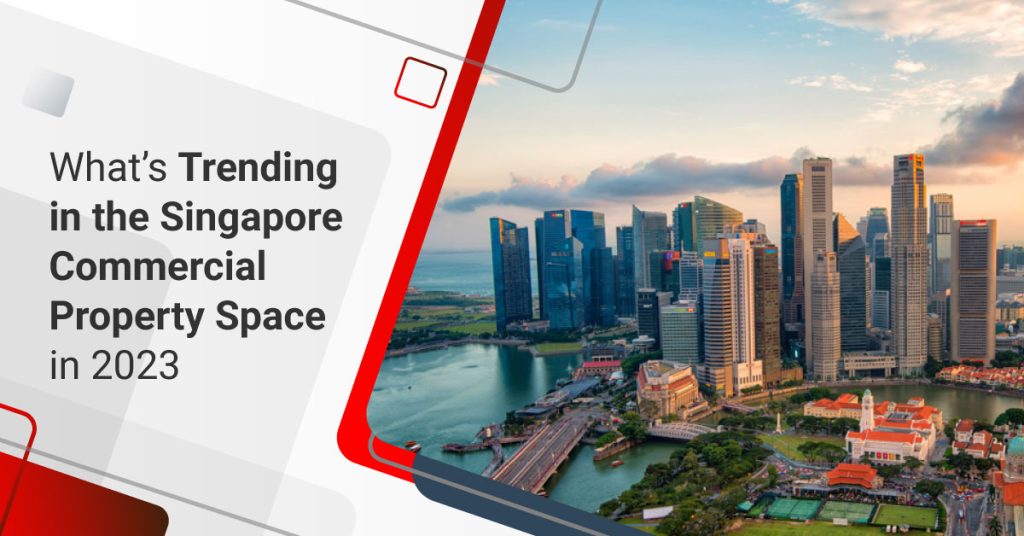
The Singapore commercial property sector has experienced significant growth and transformation in recent years.
As a thriving hub for global trade and commerce, the city-state continues to attract investors and businesses from around the world. However, 2023 brings new challenges, and with it, new opportunities for businesses to capitalise on.
In this article, we provide an in-depth analysis of the commercial landscape in Singapore for 2023.
We focus on the key trends and developments that are shaping the future of the industrial and logistics sectors, including inflation, building resilience to supply chain disruption, cost control, and more.
Key Trends in Singapore’s Commercial Property Space
Commercial properties such as industrial and logistics spaces play a crucial role in Singapore’s economy. They facilitate the movement and storage of goods necessary to meet the demands of international trade.
With its position as a global commerce hub, Singapore’s industrial and logistics sectors have seen significant growth in recent years. In this sense, we discuss some of the key trends:
Inflation and its Impact on the Industrial and Logistics Sectors
Inflation has emerged as a critical factor influencing the commercial landscape in Singapore. Rising costs of raw materials, labour, rent, and electricity are exerting pressure on businesses to adapt their strategies to maintain profitability.
Companies in the industrial and logistics sectors are increasingly investing in cost-saving technologies, such as automation and energy-efficient systems, to counter the effects of inflation and stay competitive in the market.
Related Read: How Does Sustainability in Singapore Help Firms Remain Relevant? »
Building Resilience to Supply Chain Disruption
Global trade disruptions and geopolitical tensions have highlighted the need for supply chain resilience. Companies are reevaluating their operations and seeking locations that offer stability and reliability.
Singapore’s resilience of supply chains relies on its policies and openness for the flow of goods, as well as its connectivity with the rest of the world.
This means that it has emerged as a preferred destination for businesses looking to strengthen their supply chains and reduce risks associated with unforeseen events.
Related Read: Why is the SG+ Twinning Model a Winning Supply Chain Strategy? »
Cost Control as a Priority
As businesses grapple with inflationary pressures, cost control has become a top priority.
Companies are exploring various strategies to optimise their operations, such as consolidating facilities, implementing lean manufacturing processes, and leveraging data analytics for better decision-making.
These measures help businesses maintain their competitiveness and protect their margins in an increasingly challenging economic environment.
Sectors to Watch in 2023
Several sectors within the industrial and logistics space are poised for growth in 2023, including:
- E-commerce: The rapid growth of online shopping is driving demand for warehouses, fulfilment centres, and distribution facilities.
- Cold storage: The expansion of the food and pharmaceutical industries has led to a surge in demand for specialised cold storage facilities.
- Data centres: The increasing reliance on digital infrastructure and the growing need for data storage and processing capacity are fueling demand for data centres Singapore currently hosts 60% of the data centres in the Asia Pacific region, and this is expected to grow further.
The Outlook for Singapore’s Commercial Property Space
Strong Demand for Logistics Facilities
The growth of e-commerce and the need for efficient supply chains will continue to fuel demand for logistics facilities in Singapore.
Developers are expected to focus on building state-of-the-art warehouses and distribution centres to cater to the needs of global and local businesses.
Additionally, multi-story warehouses are likely to gain popularity as companies look for innovative solutions to optimise space in land-scarce Singapore.
Revitalisation of Older Industrial Estates
To maintain its competitive edge, Singapore will need to address the ageing infrastructure of its older industrial estates.
Additionally, these real estate giants can play a crucial role in the revitalisation of older industrial estates in Singapore. They can transform underutilised sites into the ideal commercial property that caters to the needs of businesses in the digital age.
These initiatives will also help to maximise land use and contribute to the long-term sustainability of the industrial sector.
Emphasis on Innovation and Technology
As businesses in Singapore embrace Industry 4.0, the demand for technologically advanced industrial spaces will rise.
Facilities with robust digital infrastructure, automation capabilities, and smart systems will be highly sought after by forward-thinking occupiers.
The government’s push for innovation and the development of new technologies will also support the growth of specialised industrial spaces, such as research and development centres and data centers.
Greater Focus on Sustainability
The growing emphasis on sustainability will shape the future of Singapore’s industrial and logistics sectors. Developers and occupiers will prioritise green building practices, energy efficiency, and waste reduction in their operations.
This shift will not only contribute to Singapore’s environmental goals but also create long-term value for businesses and investors by improving operational efficiency, reducing costs, and enhancing overall competitiveness.
Investment Opportunities in Singapore’s Commercial Property Sector
Real Estate Investment Trusts (REITs)

Investing in industrial and logistics-focused REITs offers an attractive option for investors seeking exposure to the growth of these sectors in Singapore.
These REITs typically own a diversified portfolio of properties, including warehouses, distribution centres, retail and office spaces, and business parks.
As the demand for high-quality industrial spaces continues to rise, these REITs are expected to benefit from increased rental income and asset appreciation.
Development and Redevelopment Projects
Participating in the development and redevelopment of industrial and logistics properties presents significant opportunities for investors and developers.
As companies seek modern facilities to support their operations, investing in the construction of state-of-the-art warehouses, distribution centres, and industrial parks can generate substantial returns.
Additionally, the redevelopment of underutilised or ageing assets can unlock value by transforming these properties into attractive, high-performing assets.
Joint Ventures and Strategic Partnerships
Joint ventures and strategic partnerships offer a collaborative approach to investing in Singapore’s industrial and logistics sectors.
By partnering with local developers, investors can leverage their expertise and gain access to prime development opportunities.
These partnerships can also facilitate the sharing of resources and risk, enabling both parties to achieve their objectives and capitalise on the growth of these sectors.
Implications for Real Estate Industry Players
The evolving commercial landscape in Singapore has significant implications for major real estate industry players such as CapitaLand, Sembcorp, and CBRE.
As demand for high-quality industrial, retail, and logistics spaces increases, these companies have the opportunity to capitalise on their expertise in property development and management to cater to the evolving needs of businesses.
Players like CapitaLand, Sembcorp, and CBRE can leverage their extensive portfolios and strong market presence to develop state-of-the-art warehouses, distribution centres, and industrial parks.
They can therefore meet the growing demand for technologically advanced and sustainable facilities.
By focusing on innovation and sustainability, these companies can enhance the value of their assets and attract a diverse range of tenants from various sectors, including e-commerce, cold storage, and data centres.
Additionally, these real estate giants can play a crucial role in the revitalisation of older industrial estates in Singapore, transforming underutilised sites into modern and efficient spaces that cater to the needs of businesses in the digital age.
Through joint ventures and strategic partnerships, these industry players can collaborate with local developers and investors to unlock new opportunities and maximise the potential of Singapore’s industrial and logistics sectors.
Seizing Opportunities in the Space
The commercial landscape in Singapore for 2023 presents numerous opportunities for businesses and investors in the industrial and logistics sectors.
Driven by inflation, the focus on building resilience to supply chain disruption, cost control, and the growth of various sectors, these industries are poised for continued development and expansion.
By staying abreast of key trends and seizing the right investment opportunities, businesses and investors can thrive in Singapore’s dynamic and competitive commercial market.
Contact our team
Posts not found!
FAQs
How are companies in the industrial and logistics sectors addressing inflation and cost control?
- Companies are implementing cost-saving technologies, such as automation and energy-efficient systems, to counter the effects of inflation. They are also focusing on optimising their operations through consolidation, lean manufacturing processes, and data-driven decision-making.
What investment opportunities are available in Singapore's industrial and logistics sectors?
- Investment opportunities include industrial and logistics-focused Real Estate Investment Trusts (REITs), development and redevelopment projects, joint ventures, and strategic partnerships with local developers.
What does the commercial landscape in Singapore mean for major real estate industry players like CapitaLand, Sembcorp, and CBRE?
- These real estate industry players can capitalise on the growing demand for high-quality industrial and logistics spaces by:
- Developing state-of-the-art facilities
- Focusing on innovation and sustainability
- Participating in the revitalisation of older industrial estates


